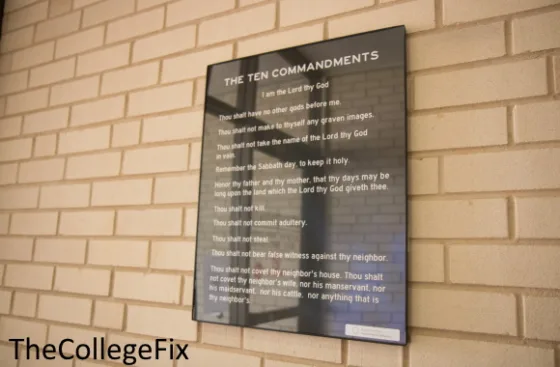The University of Arkansas (U Arkansas) has begun installing framed copies of the Ten Commandments in classrooms and publicly-funded buildings across its campus, following the passage of Act 573 of 2025, a new Arkansas law requiring public schools and institutions of higher learning to display the Ten Commandments “prominently.”
Under the terms of the law, the displays—either durable posters or framed representations—must be placed in classrooms, libraries, and other facilities maintained by taxpayer funds. The law further stipulates that the posters may be donated or purchased via voluntary contributions rather than direct taxpayer funding.
At U Arkansas, university spokesman John Thomas confirmed that approximately 500 donated posters had been received from the nonprofit Counteract USA and that installation had commenced within multiple campus buildings as the institution moves to comply.
From a conservative Christian perspective, this development resonates powerfully. The Ten Commandments are not simply a relic of historical interest—they are foundational moral imperatives rooted in biblical revelation (Exodus 20; Deuteronomy 5). Their visible posting in public education settings signals a reaffirmation of objective moral truth and the inescapable presence of the divine in shaping character and community. The law’s supporters, such as state Sen. Jim Dotson (the sponsor of the legislation), explicitly frame the display as recognition of the Ten Commandments’ role “in the history and traditions of our country.”
The move also addresses a longing among many Christians for reclamation of the public square. In an age where moral relativism often prevails in higher education, the posting stands as a visible marker of truth: certain behaviors are objectively right or wrong; the notion of absolute moral order is not only alive but publicly affirmed. For Christian students and faculty, this can serve as a gracious invitation to remember that their faith is not just private but public-worthy.
That said, the rollout has not been without debate. Some students at U Arkansas told reporters they view the postings as unnecessary or even inappropriate, arguing that religion is a personal choice and should not be mandated via display.
Others welcomed the move, seeing it as a constructive reminder of how best to live. Thus the conversation on campus continues: is the display merely historical and symbolic, or does it carry an implicit endorsement of faith-based moral order?
The institution’s official position is straightforward: “While we respect that there are differing opinions on Act 573, the practice of the University of Arkansas is to comply with the law.”
From a Christian worldview, compliance here is not mere capitulation—it may be a principled acceptance of the legitimacy of law to reflect moral foundations in public life. Romans 13 instructs believers to respect governing authorities so long as they do not force one to renounce faith in Christ. In this case, honoring a law that amplifies biblical morality aligns with responsible citizenship.
Critics, however, raise concerns grounded in constitutional jurisprudence. The law is already the subject of litigation; opponents argue that requiring display of the Ten Commandments constitutes state endorsement of specific religious doctrine in violation of the First Amendment’s Establishment Clause.
AP News While that debate has broader implications, from a conservative Christian vantage one might argue that the Ten Commandments are not sectarian in the narrow sense—they are the bedrock of Western legal and moral order, exhibited in countless public spaces for centuries. The dissenters’ insistence on a rigid secular neutrality may itself reflect a worldview that downplays the historic Christian roots of Western civilization.
Moreover, it merits noting that the law does not compel any student or faculty member to engage in religious practice, but simply posts a historic moral document. In that light, for Christian believers, the tablets serve a noble purpose: they re-anchor public education to the truth that life, law, duty and consequence are real. The presence of the Ten Commandments in corridors and classrooms is a subtle but meaningful testimony: that we live in a moral universe created by a righteous God.
In conclusion, the University of Arkansas’ action to hang the Ten Commandments across campus is more than compliance with state statute. From a conservative Christian viewpoint, it is a welcome restoration of moral marker in public life. It invites students and the broader community to remember that laws, rights and responsibilities are not mere social constructs but rooted in the one who made us. As the debates proceed in courtrooms and on campuses, believers have reason to pray—and to act—as faithful citizens and faithful witnesses.

